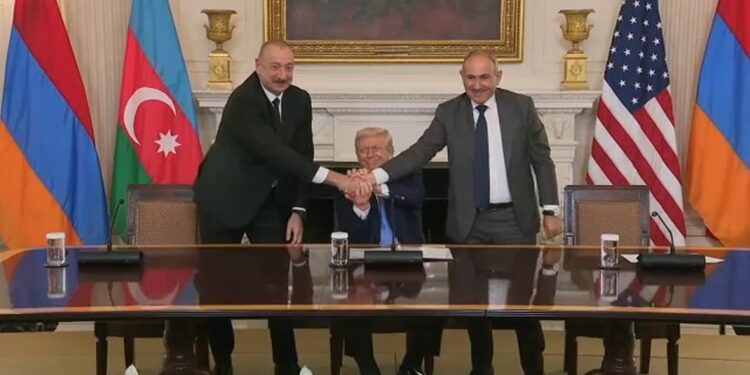In a remarkable turn of events reshaping the geopolitical landscape of the South Caucasus, a recent deal brokered under the auspices of former U.S. President Donald Trump has injected fresh momentum into efforts to resolve longstanding tensions between Armenia and Azerbaijan. The Trump Armenia-Azerbaijan agreement, which aims to foster renewed cooperation and stability in the region, is also stirring strategic recalibrations among major powers, most notably challenging Russia’s longstanding dominance. As the South Caucasus continues to be a critical crossroads of regional influence, this development signals a potential redistribution of power with far-reaching implications for regional security and diplomacy.
Trump Armenia Azerbaijan Agreement Shifts Power Dynamics in the South Caucasus
The recent deal brokered under former President Trump’s administration has introduced a significant recalibration in the geopolitical landscape of the South Caucasus. By facilitating a framework that encourages direct dialogue and cooperation between Armenia and Azerbaijan, the agreement has effectively challenged Russia’s longstanding role as the dominant power broker in the region. This shift, marked by intensified diplomatic engagements and economic initiatives, signals a strategic pivot where Washington seeks to expand its influence, diminishing Moscow’s ability to unilaterally shape post-conflict settlements or military alignments.
Key elements driving this transformation include:
- Increased US diplomatic presence: Enhanced American mediation efforts have opened new channels for conflict resolution independent of Russian oversight.
- Energy and infrastructure projects: Joint ventures supported by the agreement promote connectivity that bypasses traditional Russian-controlled routes.
- Security recalibrations: Both Armenia and Azerbaijan are diversifying military partnerships, subtly reducing reliance on Russian security guarantees.
| Factor | Pre-Deal Status | Post-Deal Impact |
|---|---|---|
| Diplomatic Influence | Predominantly Russian | Shared with US |
| Economic Integration | Russia-Centric | Multilateral Expansion |
| Security Dependence | High Russian Reliance | Emerging Diversification |
Assessing the Impact on Russia’s Regional Dominance and Strategic Interests
Russia’s longstanding position as the primary power broker in the South Caucasus faces unprecedented challenges following the Trump-brokered Armenia-Azerbaijan deal. Traditionally anchored by its military presence and energy diplomacy, Moscow’s ability to unilaterally shape regional outcomes is now diluted as both Yerevan and Baku diversify their international partnerships. The accord not only recalibrates territorial control but also signals a shift in diplomatic allegiance, emboldening external actors eager to curtail Russian hegemony. This emerging multipolar dynamic threatens to undermine Moscow’s strategic leverage, forcing a reconsideration of its engagement approach toward the South Caucasus.
- Diminished Military Influence: The perceived neutrality or sidelining of Russian peacekeepers in key conflict zones reduces Moscow’s control over ceasefire enforcement and conflict resolution mechanisms.
- Energy Transit Competition: New pipeline projects aligned with Western interests bypass traditional Russian-controlled routes, challenging its energy transit monopoly.
- Diplomatic Diversification: Both Armenia and Azerbaijan seek deeper ties with the U.S. and Turkey, broadening their security and economic options.
| Factor | Russia’s Previous Status | Post-Deal Impact |
|---|---|---|
| Military Presence | Dominant peacekeeper and security guarantor | Compromised enforcement role amid increased external involvement |
| Energy Influence | Critical pipeline operator and monopolist | Competition from alternative routes decreases control |
| Diplomatic Relations | Exclusive regional interlocutor | Regional states actively expand Western alliances |
Policy Recommendations for Washington to Leverage the New Geopolitical Landscape
In light of the shifting dynamics brought about by the Trump-brokered Armenia-Azerbaijan deal, Washington must capitalize on emerging opportunities to counterbalance Russian dominance in the South Caucasus. Prioritizing enhanced diplomatic engagement with both Yerevan and Baku is essential. This means supporting infrastructural integration projects that foster economic interdependence, while promoting transparent mechanisms for conflict resolution.
Simultaneously, the U.S. should bolster regional security frameworks by expanding military-to-military contacts and intelligence-sharing with local partners. Such moves would establish Washington as an indispensable actor in the area, diminishing Moscow’s long-standing leverage.
- Increase economic aid focused on energy diversification and connectivity.
- Strengthen democratic institutions to prevent authoritarian backsliding.
- Launch cultural and educational exchanges to nurture grassroots support.
- Leverage NATO partnerships to solidify regional stability.
| Policy Area | U.S. Objectives | Expected Outcome |
|---|---|---|
| Diplomatic Engagement | Facilitate peace talks and multilateral forums | Reduced tensions and stronger alliances |
| Economic Investment | Fund cross-border infrastructure projects | Heightened regional interdependence |
| Security Cooperation | Enhance joint training and intelligence sharing | Improved counterterrorism and stability |
| Cultural Diplomacy | Boost academic and cultural programs | Long-term trustbuilding among populations |
Insights and Conclusions
As the South Caucasus continues to be a pivotal arena for regional power dynamics, the Trump-brokered Armenia-Azerbaijan deal marks a critical shift in the balance of influence. By facilitating a fragile but consequential agreement, the United States has signaled its intent to challenge Russia’s long-standing dominance in the region. While the full implications of this development remain to be seen, it is clear that the geopolitical landscape of the South Caucasus is entering a new phase-one where external actors vie more aggressively for leverage, and local actors navigate an increasingly complex web of alliances and interests. The unfolding consequences of this deal will be closely watched by policymakers and analysts seeking to understand the future trajectory of Eurasian geopolitics.
















